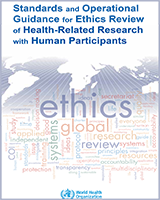Standard 10. Researchers' responsibilities
Research is performed only by persons with scientific, clinical, or other relevant qualifications appropriate to the project, who are familiar with the ethical standards applicable to their research, who submit the necessary information to the REC for review (including both the research protocol and disclosures of any conflicting interests), and who carry out the research in compliance with the requirements established by the REC.
The person conducting research fulfils the following criteria in the conduct of ethical research.
1. Submitting an application for review
An application or review of the ethics of proposed health-related research is submitted by a researcher qualified to undertake the particular study, who is directly responsible for the ethical and scientific conduct of the research. In certain jurisdictions, the sponsor of a study is responsible for submitting the research protocol to the REC.
Student applications are submitted under the responsibility of a qualified advisor / faculty member involved in the oversight of the student's work or in the student's name, co-signed by the qualified faculty supervisor.
All information required for a thorough and complete review of the ethics of proposed research is submitted, including disclosures about researchers' conflicting interests, if any.
2. Conduct of research
The research is conducted in compliance with the protocol approved by the REC.
No deviation or changes are made to the approved protocol or in following it, without prior approval of the REC, except where immediate action is necessary to avoid harm to research participants. In such a case, the REC is informed promptly of the changes/deviations made, and the justification for doing so.
The REC is informed of any changes at the research site that significantly affect the conduct of the trial, and/or reduce the protections or decrease the benefits provided or increase the risk to participants (e.g. closing down of a health facility at the research site or other impediments to obtaining access to health care that was originally available).
3. Safety reporting
All serious, unexpected adverse events related to the conduct of the study/study product or unanticipated problems involving risks of harm to the participants or others are promptly reported to the REC and/or other relevant authorities, as required by REC policies and applicable laws.
Any recommendations provided by the REC in response to such reporting are immediately implemented.
4. Ongoing reporting and follow-up
The researcher submits written summaries of the research status to the REC annually, or more frequently, if requested by the REC.
Researchers inform the REC when a study is completed or prematurely suspended/terminated.
In the case of the early suspension/termination by the researcher or sponsor, the researcher notifies the REC of the reasons for suspension/termination; provides a summary of results obtained prior to prematurely suspending or terminating the study; and describes the manner by which enrolled participants will be notified of the suspension or termination and the plans for care and follow-up for the participants.
If the REC terminates or suspends its approval of a study, the researcher informs the institution under whose authority the research is being conducted, the sponsor of the research, and any other applicable organizations.
5. Information to research participants
Researchers have a responsibility to keep the research participants and their communities informed of the progress of research by appropriate means, at suitable time-frames in simple and non-technical language, for example, when:
the research study is terminated or cancelled
any changes occur in the context of the research study that alter the potential benefits or risks
the research project is completed
results of the research are available.

